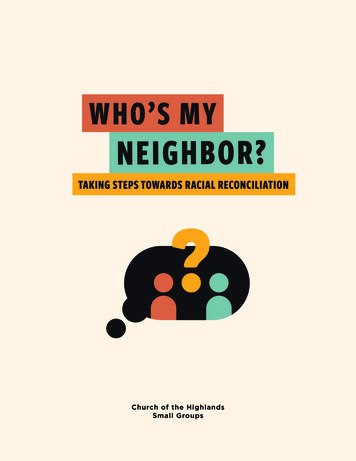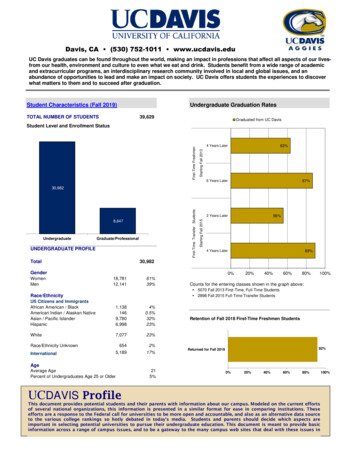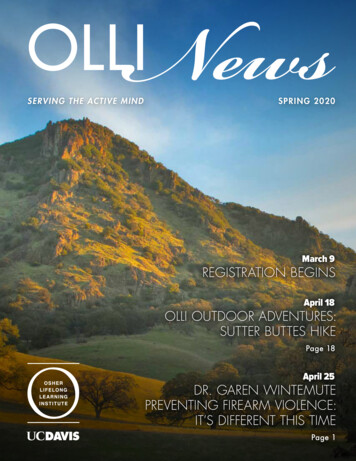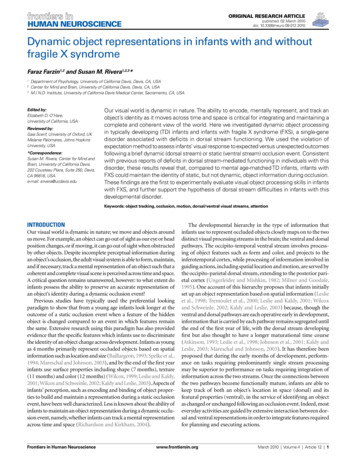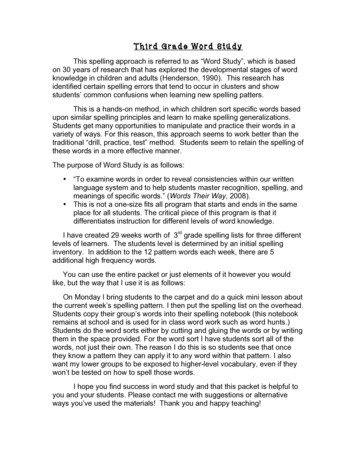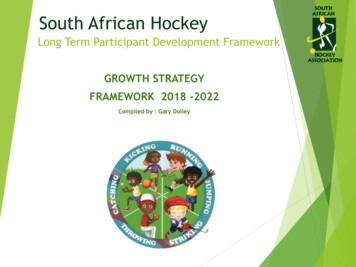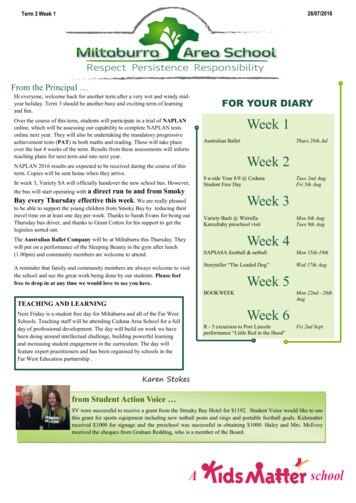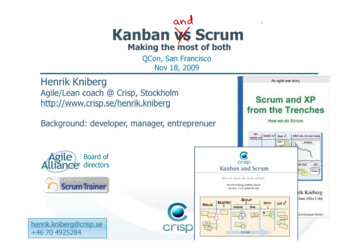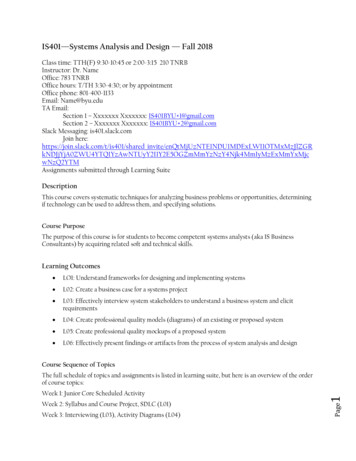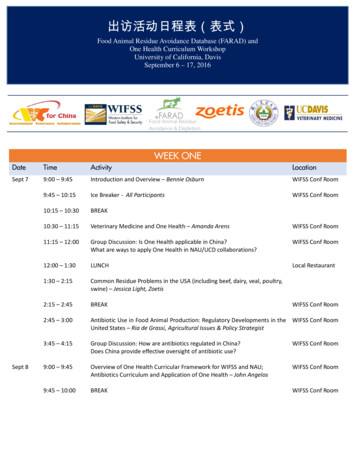
Transcription
出访活动日程表(表式)Food Animal Residue Avoidance Database (FARAD) andOne Health Curriculum WorkshopUniversity of California, DavisSeptember 6 – 17, 2016Food Animal ResidueAvoidance & DepletionWEEK ONEDateTimeActivityLocationSept 79:00 – 9:45Introduction and Overview – Bennie OsburnWIFSS Conf Room9:45 – 10:15Ice Breaker - All ParticipantsWIFSS Conf Room10:15 – 10:30BREAK10:30 – 11:15Veterinary Medicine and One Health – Amanda ArensWIFSS Conf Room11:15 – 12:00Group Discussion: Is One Health applicable in China?What are ways to apply One Health in NAU/UCD collaborations?WIFSS Conf Room12:00 – 1:30LUNCHLocal Restaurant1:30 – 2:15Common Residue Problems in the USA (including beef, dairy, veal, poultry,swine) – Jessica Light, Zoetis2:15 – 2:45BREAK2:45 – 3:00Antibiotic Use in Food Animal Production: Regulatory Developments in the WIFSS Conf RoomUnited States – Ria de Grassi, Agricultural Issues & Policy Strategist3:45 – 4:15Group Discussion: How are antibiotics regulated in China?Does China provide effective oversight of antibiotic use?WIFSS Conf Room9:00 – 9:45Overview of One Health Curricular Framework for WIFSS and NAU;Antibiotics Curriculum and Application of One Health – John AngelosWIFSS Conf Room9:45 – 10:00BREAKWIFSS Conf RoomSept 8WIFSS Conf Room
DateSept 8Sept 9TimeActivityLocation11:30 – 1:30LUNCHLocal Restaurant1:30 – 2:15Teaching Adult LearnersAn overview of effective teaching methods for adult learners studyingcomplex topics such as One Health Food SafetyHeather JohnsonWIFSS Conf Room2:15 – 2:45BREAK3:00 – 3:45Discussion about the use of Hybrid (Blended) Learning with a UC DavisSchool of Veterinary Medicine faculty member who is currently teaching ahybrid classBirgit PuschnerWIFSS Conf Room3:45 – 4:15Introduction Blended Learning Experience “Foodborne OutbreakInvestigation” – Heather Johnson and David GoldenbergWIFSS Conf Room6:00 – 8:00DINNERSeasons Restaurant102 F St, Davis9:00 – 9:45St. Patrick’s Day Revenge – David GoldenbergWIFSS Conf Room9:45 – 10:15Group Discussion: Blended Learning and its use in student instruction atNAUWIFSS Conf Room10:15 – 11:30Group Discussion: How is outreach used to implement change on dairies?Michael PayneWIFSS Conf Room11:30 – 12:00Group Discussion: How can NAU faculty implement improvements inagricultural industry practices?WIFSS Conf Room12:00 – 1:30LUNCHLocal Restaurant1:30 – 4:00Group Discussion: Develop an Action Plan; Brainstorm CurriculumDevelopment; Prioritize Next Steps for Curricular DevelopmentWIFSS Conf Room10:00 – 11:30Group Discussion: How can NAU and UCD work together to develop a OneHealth in Food Safety curriculum?WIFSS Conf Room
WEEK TWODateSept 12Sept 13Sept 14TimeActivityLocation10:00 – 10:45FARAD Program Overview – Lisa Tell2013 Valley10:45 – 1100BREAK11:00 – 12:30Videos (4) on FARAD Website; Review of FARAD Website andwww.learnfarad.com; Overview of Answering Extra-Label Drug Use Calls inthe US – Tara Marmulak, Lisa Tell2013 Valley12:30 – 1:30LUNCHOpen1:30 – 3:00FARAD Farm Call Cases; High Dose; ELDU Cases – Tara Marmulak2013 Valley3:00 – 3:15BREAK3:15 – 4:00FARAD Farm Call Cases, High Dose; ELDU Cases, Continued, and Low DoseELDU Cases – Tara Marmulak2013 Valley9:00 – 10:45FARAD Farm Call Cases, Unlabeled Species – Tara Mamulak2013 Valley10:45 – 11:00BREAK11:00 – 12:30The Ins and Outs of FARAD’s VetGram – Carolyn Whitford (University ofFlorida)2013 Valley12:30 – 2:00LUNCH with Xinbin Chen’s Laboratory TeamLocation TBD2:00 – 3:00FARAD Farm Call Cases, Unlabeled Species Continued. Extended TreatmentDuration Cases – Tara Marmulak2013 Valley9:00 – 10:45FARAD Farm Call Cases: Volume Per Injection Site – Tara Marmulak2013 Valley10:45 – 11:00BREAK11:00 – 12:30FARAD Farm Call Cases: Beef Drugs in Dairy Cattle – Tara Marmulak2013 Valley12:30 – 2:00LUNCHOpen2:00 – 3:00Kinetic Database: UnScan It Program for Data Extraction WinNonLin; 2013 ValleyInterlocution to Full Extractions – Scott Wetzlich and Maaike Clapham9:00 – 10:00Introduction and Discussion on Scientific Interests/Drug RegulatoryFramework in China – All Participants2013 Valley
DateSept 14Sept 15Sept 16TimeActivity3:15 – 4:00Kinetic Database: Full Extractions Continued – Scott Wetzlich and Maaike 2013 ValleyClapham9:00 – 10:45FARAD Farm Call Cases: Water Medication – Tara Marmulak10:45 – 11:00BREAK11:00 – 12:30FARAD Farm Call Cases: Pesticide Spray – Tara Marmulak2013 Valley12:30 – 2:00LUNCHOpen2:00 – 3:00Kinetic Database: Full Extractions Continued – Scott Wetzlich, Maaike 2013 ValleyClapham3:00 – 3:15BREAK3:15 – 4:00Full Extractions Continued – Scott Wetzlich, Maaike Clapham5:30 – 7:30GROUP DINNER9:00 – 10:45FARAD Farm Call Cases: Prohibited Drugs and Unlabeled Administration 2013 ValleyRoute – Tara Marmulak10:45 – 11:00BREAK11:00 – 12:30FARAD Farm Call Cases: – Prohibited Drugs and Unlabeled Administration 2013 ValleyRoute Continued – Tara Marmulak12:30 – 1:30LUNCHOpen1:30 – 3:00Wrap Up – Lisa Tell, Tara Marmulak, Scott Wetzlich, Maaike Clapham2013 Valley3:00 – 3:15BREAKLocation2013 ValleyBuckhornSteakhouse,Winters
WORKSHOP PARTICIPANTSJohn AngelosDr. John Angelos is Chair of the Department of Medicine and Epidemiology at the School of VeterinaryMedicine and Professor of Veterinary Medicine, Infectious Diseases. His professional interests includeinternal medicine and infectious diseases of food producing animals and development of improvedvaccination/vaccine delivery strategies to support sustainable food production practices. At WIFSS Dr.Angelos serves as a subject matter expert in livestock veterinary practice and food safety. He is aDiplomate of the American College of Veterinary Internal Medicine (Large Animal).Amanda ArensDr. Amanda Arens is Program Manager at the Western Institute for Food Safety and Security, (WIFSS),and provides coordination and oversight for outreach projects, and a team of scientific researchers andeducational specialists. Additionally, she provides expertise and experience in program development,assessment and evaluation. Dr. Arens has a strong research background in translational medicine andher current position places her at the interface of humans, animals and the environment in a One Healthapproach to food safety.Ruibing CaoDr. Ruibing Cao is Vice Dean of the College of Veterinary Medicine at Nanjing Agricultural University. Hisresearch focuses on the epidemiology, infection and immunity of Japanese encephalitis virus and duckTembusu virus.Xinbin ChenDr. Xinbin Chen is Professor at UC Davis Schools of Medicine and Veterinary Medicine. He is leader ofthe Comparative Oncology Program at the two schools. The comparative oncology program has the goalof drawing on key strengths of UC Davis in animal research pertaining to the disease mechanisms thatare implicated in the genesis and progression of cancer. Dr. Chen’s research focuses on the function ofthe p53 family in tumor suppression, development, and aging.Maaike ClaphamMaaike Clapham has a Bachelor’s of Science in Animal Science and Management with an emphasis inlivestock from University of California, Davis. As an undergraduate at UC Davis she was a studentmanager of the UC Davis Swine Center and a necropsy technician at California Animal Health and FoodSafety Laboratory. She is currently a research assistant within the FARAD laboratory, additionally shemanages the T.S. and K.D. Glide Foundation which is home to 120 horses and other animals.Ria de GrassiRia de Grassi, M.S., is an agricultural issues and policy strategist who consults on special projects vital toagricultural research, animal health and welfare, and food and agriculture critical infrastructure. Ms. deGrassi worked for an agricultural nonprofit for more than 25 years representing the food animal sector.She helped initiate the California Dairy Quality Assurance Program and continues to advise the School ofVeterinary Medicine’s Center for Food Animal Health at UC Davis.
David GoldenbergDavid Goldenberg is an instructor in food safety with the Western Institute for Food Safety and Security.He contributes to food safety projects for the U.S. Food and Drug Administration (FDA) Integrated FoodSafety System (IFSS). He is involved in the produce investigations course and is working on integratingvideo and table top exercises to enhance adult learning principles.Heather JohnsonHeather Johnson, M.S., is an instructional systems designer and educational specialist at WIFSS. Sheoversees the instructional design component of WIFSS training and educational projects in accordancewith certification standards that meet local, state and federal agency requirements. She designs blendedlearning educational materials specifically using principles of adult education.Jessica LightDr. Jessica Light is a Senior Veterinarian in the Zoetis Dairy Technical Services Team. Dr. Light works withveterinarians and dairy producers to improve dairy cattle care and productivity. She currently serves onthe Agriculture Committee of the California Veterinary Medical Association and as a Zoetis Master.Tara MarmulakDr. Tara Marmulak is the Food Animal Residue Avoidance & Depletion (FARAD) Coordinator in theDepartment of Medicine and Epidemiology at UC Davis, School of Veterinary Medicine. She advisesveterinarians on appropriate withdrawal intervals for extra label drug use in food animals. Dr. Marulak’sbackground as a pharmacist and resident in veterinary medicine make her uniquely qualified to assessthe pharmacokinetics of drugs in food animals.Bennie OsburnDr. Bennie Osburn is Director of Outreach and Training at the Western Institute for Food Safety andSecurity. He is Dean Emeritus of the School of Veterinary Medicine, UC Davis. Dr. Osburn’s research hasfocused on infectious diseases of livestock, zoonotic diseases, including foodborne pathogens, and theecology of infectious agents. He is interested in applying a One Health approach to food safety.Michael PayneDr. Michael Payne is a researcher and outreach coordinator at WIFSS. Dr. Payne has worked as aveterinarian in extension, academics and private practice. He is director of the California Dairy QualityAssurance Program, an industry, academic regulatory partnership which promotes the health andwelfare of livestock, consumers and the environment through outreach, education and research.Birgit PuschnerDr. Birgit Puschner, Professor, and Chair, of the Department of Molecular Biosciences, School ofVeterinary Medicine, focuses her research on diagnostic veterinary toxicology; poisonous plants; algaltoxins; and natural toxins. She teaches toxicology in the veterinary professional curriculum andpharmacology and toxicology in the graduate curriculum. In the past 3 years, she developed anundergraduate course that utilizes online and hybrid teaching modalities to provide an introductorycourse in toxicology/pharmacology.
Lisa TellLisa Tell, DVM, has been a UC Davis School of Veterinary Medicine faculty member since 1997. She isboard certified with the American College of Zoological Medicine and the American Board of VeterinaryPractitioners (Avian Specialty). Her academic research career initially focused on treatment of avianinfectious diseases and evolved into drug residues in animal derived human food products. She iscurrently the director of the Western Region Food Animal Residue Avoidance and Depletion programthat focus on public health and mitigating drug residues in animal derived food products.Liping WangDr. Liping Wang is a professor in the College of Veterinary Medicine at Nanjing Agricultural University.Her research focuses on establishing information systems on antimicrobial use and the emergence ofbacterial resistance in animal populations in China. Dr. Wang studies the association between drugexposure and the emergence of bacterial resistance in animal populations under different dosageregimen conditions.Scott WetzlichScott Wetzlich is a staff research associate in the Department of Medicine and Epidemiology at the UCDavis School of Veterinary Medicine. He manages the research activities in the laboratory of Dr. Lisa Tellwhich includes FARAD and the minor use /minor species animal drug program (NRSP-7). He has 28 yearsof analytical experience focused on projects related to obtaining drug approval for minor food animalspecies.Carolyn WhitfordCarolyn Whitford is an IT Project Manager at the University of Florida and provides database and website support for FARAD. She is responsible for updating the SQL data used for VetGRAM applications andoversees the development of the Android and Apple versions. She also perpetuates the FARAD website,Facebook Page and Twitter accounts. Carolyn has been with FARAD since April of 1999.Ruqian ZhaoDr. Ruiqian Zhao is a professor in the Laboratory of Animal Physiology and Biochemistry in the College ofVeterinary Medicine at Nanjing Agricultural University. Her research focuses metabolic and biochemicalpathways in lactating adults and neonatal animals. She also has served as an administrator in theCollege of Veterinary Medicine.
livestock from University of California, Davis. As an undergraduate at UC Davis she was a student . Lisa Tell, DVM, has been a UC Davis School of Veterinary Medicine faculty member since 1997. She is board certified with the American College of Zoological Medicine and the American Board of Veterinary Practitioners (Avian Specialty). .
